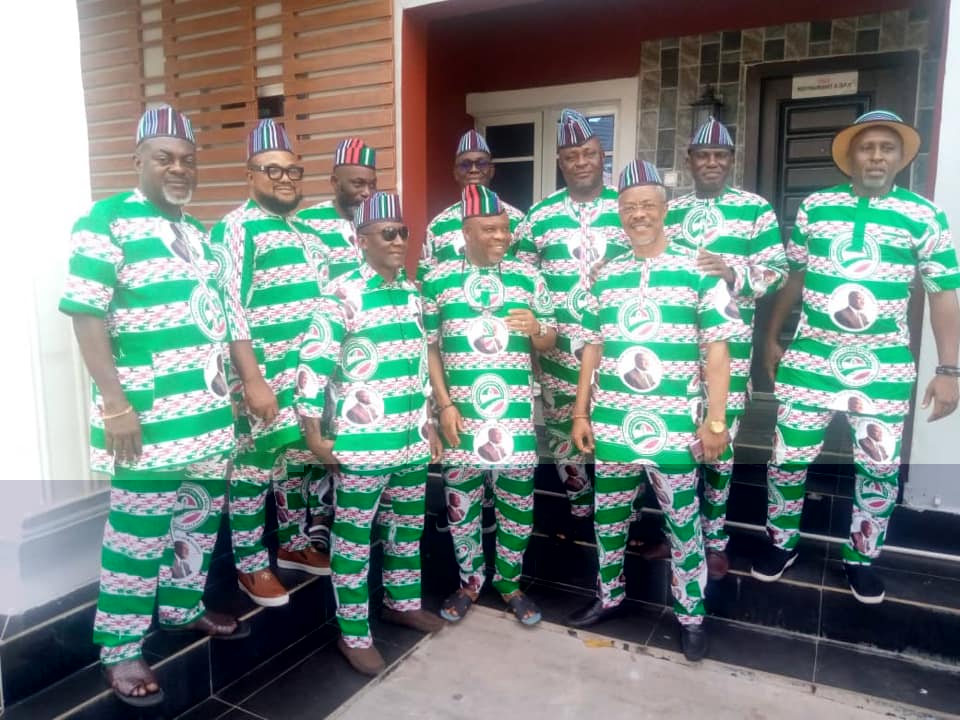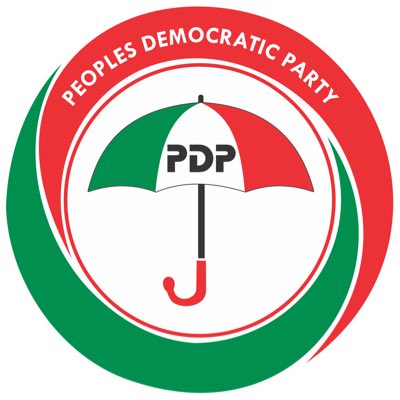Politics
APC, PDP Kick As NASS Approves Direct Primaries

Both the ruling All Progressives Congress (APC) and the main opposition Peoples Democratic Party (PDP) have expressed reservations about the decision by the National Assembly to mandate political parties to adopt direct primaries in selecting candidates for election in the Electoral Act Amendment bill it passed yesterday.
Governor Abubakar Bagudu of Kebbi and chairman, Progressives Governors Forum (PGF), said that adopting direct primaries by political parties would overstretch the Independent National Electoral Commission (INEC).
He said this while speaking with newsmen at the end of a closed-door meeting held by members of the PGF on Monday night.
The PGF is an umbrella body of serving governors elected on the platform of the ruling All Progressives Congress (APC).
The National Assembly has adopted Section 87 on mandatory direct primaries for all parties.
Bagudu said the decision by INEC to make it mandatory for political parties to elect their candidates for elective positions through direct primaries could be undemocratic.
He said the Forum discussed problems associated with direct primaries, noting that there had been concerns that political parties were voluntary organisations.
The governor said the concern of the governors is that if you limit the abilities of parties to choose options that they so desired, “that may even be arguably undemocratic”.
He explained that this was because nothing stops one party from adopting one or the other.
The PGF chairman said the meeting, among other things, reviewed developments in the polity and in the APC states especially, as well as the party’s membership registration and the congresses that had successfully been conducted.
The chairman appreciated the Governor Mai Mala Buni-led Caretaker and Extra-ordinary Convention Planning Committee (CECPC) for the success of the congresses, for supporting APC states and for taking steps to resolve issues wherever they arose.
“In particular, the governors were appreciative of the CECPC because of its respect for President Muhammadu Buhari’s expectations that they should support the party bottom-up, and I think that had been achieved in the last exercise.
“Equally, we reviewed the congresses and advised on how we think it should strengthen our democracy,” he said, noting that the party’s planned National Convention was in progress.
He described as a big milestone the just-concluded APC state congresses, saying that the appeals processes had also been conducted.
“I believe that, soon, the party will inaugurate all the state executives, and then some of the outstanding congresses that are to take place in Zamfara and Oyo states and three other states will be concluded.
“Then we are on our way to setting a date for the National Convention,” he said.
Present at the meeting were governors of Nasarawa, Kano, Kebbi, Ekiti, Plateau, Yobe, Kogi, Ebonyi, Gombe and Osun states, while Lagos and Ondo state governors were represented by their deputies.
Also, the Peoples Democratic Party (PDP) has rejected the direct primary system for nomination of candidates for elections by political parties recently passed by the National Assembly.
The national publicity secretary of the PDP, Kola Ologbondiyan, while reacting to the issue of mandatory direct primaries said: “Our party holds that it is the inalienable right of each political party, within the context of our constitutional democracy, to decide its form of internal democratic practices, including the processes of nominating its candidates for elections at any level.
He added that no political party should force its own processes on any other political party, as the direct primaries’ amendment, a practice of the ruling APC, sought to achieve.
“Having stated this, the PDP shall, within the next 48 hours, make its final decision in respect of this amendment.”
This came as the National Assembly yesterday passed the harmonised version of the 2021 Electoral Act Amendment Bill, approving direct primary elections for political parties and also gave the Independent National Electoral Commission (INEC) the nod for electronic voting and electronic transmission of election results.
With this, the National Assembly has laid to rest the vexed issue of the mode of primaries to be adopted by the various political parties for the emergence of their candidates in the 2023 general election.
It also, as contained in clause 52 of the 2010 Electoral Act (Amendment) Bill 2021 earlier recommended by the Senate, gave INEC approval for the usage of technological/electronic devices in the conduct of elections and transmission of results.
Concurrence to this effect by both chambers of the National Assembly followed adoption of a report of Conference Committees set up by the Senate and the House of Representatives in July this year by the Senate in plenary on Tuesday.
A total of 21 clauses as presented by the leader of the Senate Committee on Harmonisation, Senator Yahaya Abdullahi ( APC, Kebbi North) , were harmonised by either adopting the one earlier adopted by the Senate or House of Representatives .
Yahaya Abdullahi in presenting the report said: “The objective of the Conference Committee was a reconciliation of the differences in a few clauses of the bill as passed by the Senate and the House of Representatives.
“The clauses are 1, 5, 6, 15, 16, 17, 23, 24, 31, 36, 43, 49, 50, 52, 63, 76, 87, 97, 98, 117 and 135
Niger Delta
PDP Declares Edo Airline’s Plan As Misplaced Priority

News
Oji Clears Air On Appointment Of 15 Special Advisers By Fubara

The Special Adviser on Political Affairs to the Rivers State Governor, Dr. Darlington Oji, has disclosed that about 15 Special Advisers to the governor were duly approved by the Rivers State House of Assembly before the current political crisis in the State.
Oji made the disclosure in a Television programme in Port Harcourt, recently, while reacting to issues surrounding appointments, the impeachment moves against the governor and his deputy, and allegations of financial mismanagement.
He clarified that the appointment of Special Advisers was carried out in strict compliance with constitutional provisions, and received the approval of the Rivers State House of Assembly under the leadership of the Speaker, Martins Amaewhule, before the crisis began.
According to the Special Adviser, the appointments did not require any further screening, countering claims that the governor violated due process in constituting his advisory team.
On the impeachment proceedings against Governor Siminalayi Fubara, and his deputy, Professor Ngozi Odu, Oji described the process as unfounded and lacking constitutional backing.
He said that several lawmakers who initially supported the impeachment move were now reconsidering their stance after discovering that the process had no legal basis.
Oji also attributed the impeachment plot to personal and political ambitions, saying it is not motivated by the interest or welfare of the people of Rivers State.
Speaking on the financial position of the State after the Emergency Rule, the Special Adviser disclosed that the governor met about ?600 billion in the state’s coffers upon assumption of office.
He explained that the availability of funds enabled the administration to continue governance smoothly without the need for a supplementary budget.
The governor’s aide also refuted allegations of financial mismanagement against the governor, and stressed that all allocations to lawmakers and constituency projects were transparently handled.
He maintained that the Fubara administration remained focused on development, stability, and good governance despite the political distractions in the State.
Oji expressed confidence that the impeachment moves would eventually be abandoned as legislators and the public become more informed, adding that the governor’s leadership has continued to reassure citizens and sustain political stability in the State.
King Onunwor
Politics
Rivers Political Crisis: PANDEF Urges Restraint, Mutual Forbearance

Accordingg to the statement, the Board and National Executive Committee of PANDEF, noted with very grave concern the recent spate of political developments in Rivers State.
“Regrettably, these developments have now degenerated into the decision of the Rivers State House of Assembly to commence impeachment proceedings against the governor and deputy governor.
“This is a deeply disturbing situation that demands urgent attention in order to forestall further escalation and breakdown of law and order.
“This concern is heightened by the critical importance and strategic centrality of Rivers to the Niger Delta region and to the broader socio-political stability and economic wellbeing of Nigeria as a whole”, the statement said.
The Forum called on all parties involved in the resurgent political imbroglio to sheathe their swords and embrace peace.
“This should be guided by the principles of give-and-take, dialogue, tolerance, and political equanimity.
“All stakeholders must place paramount importance on peace, development and the welfare of the people of Rivers.
“We must now focus squarely on good governance and development of the state,” the Forum said.
PANDEF commended President Bola Tinubu, the leadership of the All Progressives Congress (APC), respected elders of Rivers State, and other well-meaning Nigerians for their previous and ongoing efforts aimed at restoring peace and stability in the state.
-

 News4 days ago
News4 days agoDon Lauds RSG, NECA On Job Fair
-

 Niger Delta2 days ago
Niger Delta2 days agoPDP Declares Edo Airline’s Plan As Misplaced Priority
-

 Sports2 days ago
Sports2 days agoSimba open Nwabali talks
-

 Nation2 days ago
Nation2 days agoHoS Hails Fubara Over Provision of Accommodation for Permanent Secretaries
-
Niger Delta2 days ago
Stakeholders Task INC Aspirants On Dev … As ELECO Promises Transparent, Credible Polls
-
Niger Delta2 days ago
Students Protest Non-indigene Appointment As Rector in C’River
-

 Oil & Energy2 days ago
Oil & Energy2 days agoNUPRC Unveils Three-pillar Transformative Vision, Pledges Efficiency, Partnership
-
Rivers2 days ago
Fubara Restates Continued Support For NYSC In Rivers

